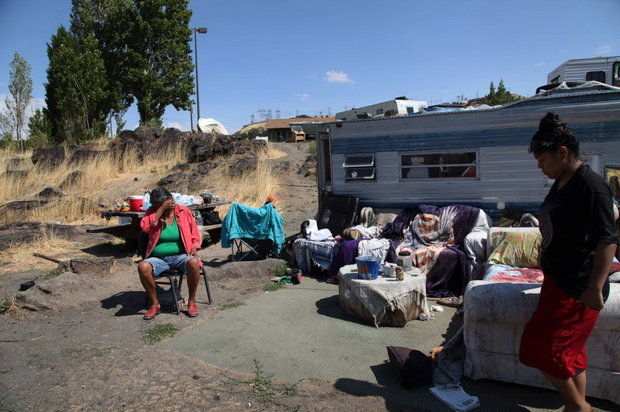forum
library
tutorial
contact

Sen. Jeff Merkley Tries to Force White House to
Finish Tribal Housing Work on Columbia River
by Molly Harbarger
The Oregonian, May 14, 2016
|
the film forum library tutorial contact |

|
Sen. Jeff Merkley Tries to Force White House to
by Molly Harbarger
|
 The director of the federal Office of Management and Budget says that nowhere is it written he has to fund housing developments for Columbia River tribal members. So, the Northwest's congressional delegation plans to put it in writing.
The director of the federal Office of Management and Budget says that nowhere is it written he has to fund housing developments for Columbia River tribal members. So, the Northwest's congressional delegation plans to put it in writing.
Mick Mulvaney told Oregon and Washington lawmakers last October that he would not free up the $1.6 million in funding they expected, despite a 1950s-era law that authorizes the U.S. Army Corps of Engineers to build homes for tribal members displaced when a dam was built near The Dalles. Nor was he swayed that funds had been appropriated by the outgoing head of the Army Corps under President Barack Obama or the fact that half the work was already done.
Since then, tribal delegations and lawmakers have met with Mulvaney's staff and called the director himself advocating for the project, to no avail.
In March, Sen. Jeff Merkley, D-Oregon, who spearheaded the effort, added a line into the omnibus spending bill that "encouraged" the Army Corps to finish the work, but the Trump administration refused.
So now, Merkley said he is going to include firmer language in an upcoming bill that sets the spending priorities for the Army Corps.
A 2013 report by Portland-based engineers estimate that at least 84 houses are owed to tribal members along the river. That report went nowhere, but provides a basis for village planning. By the time funding was pulled, tribes were at the point of planning how many houses they'd ideally want.
No houses have been built, except for 15 at Celilo Village, which serve a fraction of the need.
However, earmarks -- or line items in budget bills that serve one particular project in one location -- were outlawed under the Obama administration. Merkley and other politicians must now be careful where they are allowed to use words like "shall" for fear it be struck as an earmark. The America's Water Infrastructure Act of 2018 is one place that will fly.
Merkley, who sits on the Senate Ways and Means Committee, wants to pass a bill that says the Army Corps "shall complete a village development plan for any Indian village submerged as a result of the construction of the Dalles Dam, Oregon." It also would command the Corps to study and provide housing to Native Americans displaced by the Bonneville and John Day dams.
The effort to replace the destroyed houses started in 2016 after The Oregonian/OregonLive reported that the federal government had promised to do so 80 years ago and never fulfilled that promise. Since then, bipartisan support in both the House and Senate has grown to complete the work.
The Army Corps in the Northwest started to work with tribes to design and site a village near The Dalles Dam. However, that work was supposed to be funded in two budget cycles.
By the time the $1.6 million was needed to finish the plan, it had been removed from the budget.
"Some of the obstacles they've placed before us seem to simply be manufactured obstacles rather than real ones," said Charles Hudson in March, intergovernmental affairs director at the Columbia River Inter-Tribal Fish Commission. "We do get the strong impression they don't want to support this project, but they are running out of excuses to do so."
Hudson said the tribes welcome the precision of this bill. Though the tribes have at times had a contentious relationship with the Army Corps over dam issues, the head has told Congress that morals and ethics compel them to finish this project.
"Clearly the issue has moved beyond, in my view, as a regional priority to a national priority," Hudson said.
The tribes and the Northwest delegation are also pressing the U.S. Bureau of Indian Affairs to figure out how to provide more money to maintain 30 existing fishing sites where tribal members live six months to year-round to exercise their treaty fishing rights.
The sites, as The Oregonian/OregonLive illustrated, are unsafe, unsanitary and not built for people to live there full-time.
learn more on topics covered in the film
see the video
read the script
learn the songs
discussion forum
